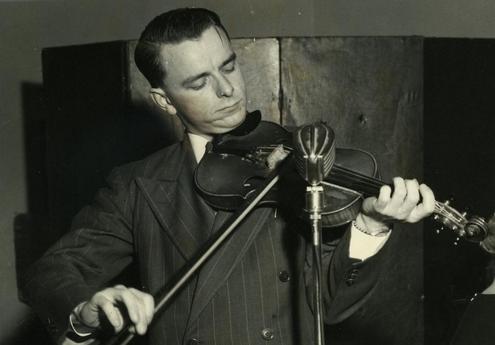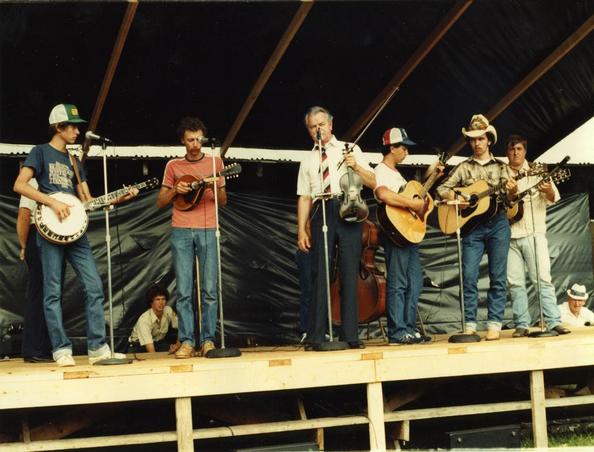|
Note: This post was previously listed under our "News from the Grey Box" blog series Part 3 of a 4-part series By Malorie Matos When Senator Byrd played his fiddle on the Grand Ole Opry in 1979, country musician Ben Smathers told him he was glad to see that a fiddle player was helping to run the government. This was the sentiment of many voters in West Virginia who kept Byrd in office for so long. His fiddling created a country-boy persona to which voters could relate. But not everyone found that persona appealing. Robert Byrd’s fiddle helped to bring him political success, but it also brought him ridicule from opponents and the media. Byrd’s fiddling became an easy target for his opponents. In his early campaigns especially, established politicians mocked the backwoods image of Byrd as a fiddle playing butcher. The ridicule did not prevent Byrd from winning his elections, but it persisted throughout most of his career. Often, ridicule of Byrd’s fiddling came in the form of newspaper articles and editorials. In 1954, when Byrd’s congressional career was still fairly new, one writer claimed that “a fiddle-playing politician is pretty hard for a man of my sensibilities to stomach.” He wondered how voters could believe that a man playing “Old Zip Coon with dexterity on a fiddle therefore qualifies for public office.” [1] Similarly harsh words regarding his fiddling followed Byrd throughout his career. Even in the 1970’s, when his political stature was well-established, newspapers continued to scoff at Senator Byrd’s fiddle-playing country image. Surprisingly, many negative comments on Byrd’s fiddling came from his beloved state of West Virginia. Although Byrd’s music had served as a way to relate to the people, some West Virginians felt they could not relate and that “fiddlin’ Bob Byrd” only perpetuated negative stereotypes of their state. A 1976 op-ed piece in the Charleston Daily Mail expressed worry about possible press coverage of an event where Senator Byrd had recently played some bluegrass music: “And thus is preserved the very popular notion that West Virginia is a backwoods state where very few can afford shoes and everybody drinks corn likker.” Backlash against Byrd’s fiddling did not always come in the form of criticizing his “hillbilly” persona. Some opponents used the fiddle to underscore any political disagreements they had with the senator. One of the most popular forms of Byrd-bashing compared the senator to the infamous Emperor Nero, who was said to have played his fiddle as Rome burned around him. Newspapers often referenced Nero when discussing Senator Byrd. In a satirical senatorial award ceremony printed in 1981, Byrd was named recipient of the fictitious “Emperor Nero Medallion” for continuing to play his fiddle at an event as his aides attempted in vain to tell him about the Secretary of State’s resignation. When asked about Byrd’s playing at Democratic functions, Republican Senator Howard Baker once said that he “hoped they are not reminded that he is fiddling while the party burns.”[2] When a politician has a quirky talent, like Byrd’s fiddling, it is almost inevitable that the talent will become the butt of political jokes or the target of oppositional attack. In spite of the ridicule he often faced, Senator Byrd continued to publicly display his fiddling skills until the late 1980’s, when physical limitations caused him to stop. Byrd knew that he owed much of his success to the charm of the fiddle, despite the criticisms he received. Political adversaries may have associated the fiddle with “hillbilly” backwardness and constituents may have feared the perpetuation of West Virginia stereotypes, but Byrd understood that fiddling strengthened his Appalachian roots that so attracted many voters. He did not allow any ridicule to take away from the cultural importance of mountain music. [1] L.T. Anderson, “In Reverse,” Charlestown Gazette, November 21, 1954.
[2] “Sen. Byrd’s Nonpartisan Fiddle Overlooked by Republican Party,” Santa Ana Orange County Register, June 1, 1977. Comments are closed.
|
Welcome to the Byrd Center Blog! We share content here including research from our archival collections, articles from our director, and information on upcoming events.
Categories
All
Archives
July 2023
|
Our Mission: |
The Byrd Center advances representative democracy by promoting a better understanding of the United States Congress and the Constitution through programs and research that engage citizens.
|
Copyright © Robert C. Byrd Center for Congressional History and Education
|



 RSS Feed
RSS Feed
